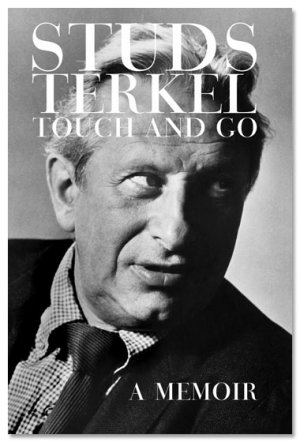 TEXAS OBSERVER: He is beloved “Uncle Studs” to many who grew up listening to WFMT, the Chicago radio station that broadcast his eclectic daily mix of music and interviews from 1952 to 1997. To anyone who has ever heard his raspy, empathetic voice, there is only one Studs: Studs Terkel, singer of the unsung American. Louis Terkel acquired his nickname in the 1930s while performing in Clifford Odets’ Waiting for Lefty. He was carrying around books by fellow Chicagoan James T. Farrell, and to differentiate Terkel from two others in the cast also named Louis, members of the Chicago Repertory Group began calling him by the name of Farrell’s scrappy protagonist. Today Studs Terkel is more famous than Studs Lonigan, and he begins his new memoir by modestly characterizing himself as “celebrated for having celebrated the lives of the uncelebrated among us; for lending voice to the face in the crowd.”
TEXAS OBSERVER: He is beloved “Uncle Studs” to many who grew up listening to WFMT, the Chicago radio station that broadcast his eclectic daily mix of music and interviews from 1952 to 1997. To anyone who has ever heard his raspy, empathetic voice, there is only one Studs: Studs Terkel, singer of the unsung American. Louis Terkel acquired his nickname in the 1930s while performing in Clifford Odets’ Waiting for Lefty. He was carrying around books by fellow Chicagoan James T. Farrell, and to differentiate Terkel from two others in the cast also named Louis, members of the Chicago Repertory Group began calling him by the name of Farrell’s scrappy protagonist. Today Studs Terkel is more famous than Studs Lonigan, and he begins his new memoir by modestly characterizing himself as “celebrated for having celebrated the lives of the uncelebrated among us; for lending voice to the face in the crowd.”
Studs sums up his own life in a deprecating phrase: “I’m a disc jockey who happens to have written some books.” Those books and that life are not likely to be forgotten soon. “Oh, to be remembered—isn’t that what this is all about?” asks Studs, who will be remembered longer and more widely and fondly than most of the rest of us. His own powers of recall have not yet evaporated, but he does not dwell entirely in the past. He is sufficiently invested in the future to worry about the consequences awaiting a culture that has erased its collective memory. “We have a language perverted, a mind low-rated, and of course, the inevitable end result forgetfulness,” he complains. Though some others who survive to his advanced age are plagued by amnesia, nonagenarian Studs has not lost the ability or desire to remember. He uses history to accentuate a present that has been severed from its antecedents. “What I’m talking about,” he writes, “is what I call a national Alzheimer’s—a whole country has lost its memory.” MORE
CHICAGO TRIBUNE: “My epitaph? My epitaph will be, ‘Curiosity did not kill this cat,'” he said.
